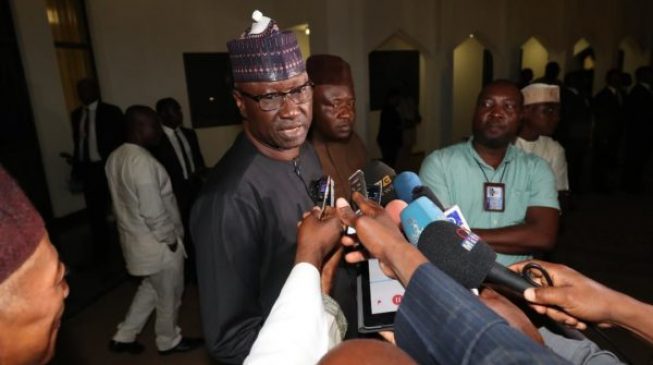
The Federal Government has extended the gradual easing of the COVID-19 lockdown across the country by two additional weeks.
This was disclosed by the Chairman of the Presidential Task Force (PTF) on COVID-19, Boss Mustapha, who also doubles as the Secretary of the Government of the Federation (SGF).
He made the disclosure during the COVID-19 daily briefing on Monday in Abuja.
The SGF said that the global epicenter of the pandemic has shifted from China to Europe to the U.S. and was now showing a shift to South and Central America.
“This shift to South America with virtually similar climatic and demographic similarities with Africa, is a cause for concern when we consider the fact that earlier projections pointed to Africa as likely to be the worst hit continent, by the pandemic.
“As at midnight on Sunday, May 31, 2020, Nigeria recorded 10,162 confirmed cases of COVID-19, 3,007 discharges and 287 deaths. Significantly, Nigeria recorded 553 new cases on Saturday, May 30, 2020 representing the highest single-day numbers, ever,” he said.
According to him, Based on the overall assessment, including available data on the public health considerations and resultant economic impacts, the PTF is of the opinion that.
“Nigeria is ready to allow SCIENCE and DATA determine her cautious advancement into the second phase of the eased lockdown for a period of four weeks.
“After considering all factors mentioned above, the PTF submitted its recommendations and President Mohammadu Buhari has approved the following for implementation over the next four weeks spanning June 2 to June 29, 2020, subject to review,” he noted.
Mustapha gave cautious advance into the Second Phase of the national response to COVID-19; Application of science and data to guide the targeting of areas of on-going high transmission of COVID-19 in the country.
“This means mobilization of all resources at State and Local Government levels to create public awareness on COVID 19 and improve compliance with non-pharmaceutical interventions within communities.
“ Sustenance of key non-pharmaceutical interventions that would apply nationwide and include:
“Ban of gatherings of more than 20 people outside of a workplace.
“Relaxation of restriction on places of Worship based on guidelines issued by the PTF and Protocols agreed by State Governments
“Managed access to markets and locations of economic activity to limit the risk of transmission. Ban on inter-state travels except for movement of agricultural produce, petroleum products, manufactured goods & essential services;
“Mandatory use of non-medical face masks in public places; Mandatory provision of handwashing facilities/sanitisers in all public places.
“Extensive temperature checks in public places; Maintaining 2 metres between people in public places; Strengthening infection prevention and control at healthcare facilities.
“Isolation of vulnerable populations “elderly and those with underlying health conditions”Massive information and education campaigns.
“Deepening of collaborative efforts with community leaders, civil society, faith-based organisations, traditional institutions, etc;
“Continuous mobilisation of State Govts to take up greater role in the implementation of the guidelines and advisories provided by the PTF.
“Deepening of collaborative efforts with community leaders, civil society, faith-based organisations, traditional institutions, etc;
“Continuous mobilisation of State government to take up greater role in the implementation of the guidelines and advisories provided by the PTF,”he stated.




This post has reinforced my belief in the power of gaining insights from others.
纸飞机中文版 群组功能强大,可容纳大量成员,适合社群交流和信息分享。
Excellent information. Very useful to everybody